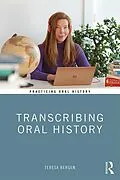Transcribing Oral History offers a comprehensive guide to the transcription of qualitative interviews, an often richly debated practice within oral history. Beginning with an introduction to the field and an overview of the many disciplines that conduct and transcribe interviews, the book goes on to offer practical advice to those looking to use transcription within their own projects. A helpful how-to section covers technology, style guides, ways to format transcripts and troubleshoot the many problems that can arise. In addition to the practicalities of transcription itself, the book encourages the reader to consider legal and ethical issues, and the effects of troubling audio on the transcriptionist. It explains how scholars can turn recorded interviews and transcripts into books, films and museum exhibits, enabling the reader to understand the wider concerns surrounding transcription as well as the practical uses to which it can be put.
Based upon the author's personal experience as a freelance transcriptionist and interviews with more than 30 professionals working around the world in the oral history and qualitative research fields, this is an indispensable guide for those involved in interviews and transcription at any level of an oral history project, including historians, transcriptionists, interviewers, project administrators, archivists, researchers and students.
Autorentext
Teresa Bergen is a freelance writer and transcriptionist based in Portland, Oregon. She has transcribed, indexed and edited qualitative interviews for more than 20 years, and is a member of the Oral History Association. Her articles appear in many consumer magazines and websites.
Klappentext
Transcribing Oral History offers a comprehensive guide to the transcription of qualitative interviews, an often richly debated practice within oral history. Beginning with an introduction to the field and an overview of the many disciplines that conduct and transcribe interviews, the book goes on to offer practical advice to those looking to use transcription within their own projects. A helpful how-to section covers technology, style guides, ways to format transcripts and troubleshoot the many problems that can arise. In addition to the practicalities of transcription itself, the book encourages the reader to consider legal and ethical issues, and the effects of troubling audio on the transcriptionist. It explains how scholars can turn recorded interviews and transcripts into books, films and museum exhibits, enabling the reader to understand the wider concerns surrounding transcription as well as the practical uses to which it can be put.
Based upon the author's personal experience as a freelance transcriptionist and interviews with more than 30 professionals working around the world in the oral history and qualitative research fields, this is an indispensable guide for those involved in interviews and transcription at any level of an oral history project, including historians, transcriptionists, interviewers, project administrators, archivists, researchers and students.
Inhalt
List of Figures, Tables and Boxes
Foreword
Preface
Acknowledgements
Chapter One: About Oral History and Transcription
Chapter Two: Getting Started
Chapter Three: Transcription vs. the Alternatives
Chapter Four: Technology and Equipment
Chapter Five: Transcription Step by Step
Chapter Six: Hard Decisions
Chapter Seven: Editing and Polishing
Chapter Eight: Legal, Ethical and Regulatory Issues
Chapter Nine: The Human Side of Transcription
Chapter Ten: Using Transcripts for Research
Chapter Eleven: Conclusions
Appendices
List of People Interviewed in Book
Resources
Index
